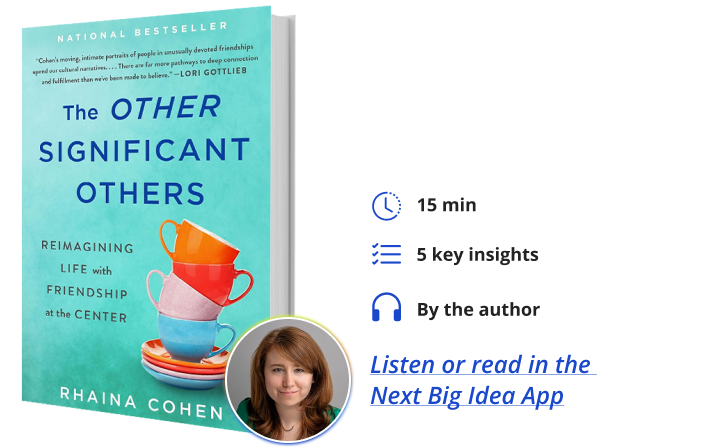Rhaina Cohen is an award-winning producer and editor for NPR’s documentary podcast, Embedded. Her work has aired on numerous podcasts and radio shows, including Hidden Brain, Invisibilia, and All Things Considered, and her writing has appeared in The Atlantic, The Washington Post, and elsewhere. The recipient of a fellowship from the National Endowment for the Humanities, Cohen is a graduate of Northwestern University and Oxford, where she was a Marshall Scholar.
Below, Rhaina shares five key insights from her new book, The Other Significant Others: Reimagining Life with Friendship at the Center. Listen to the audio version—read by Rhaina herself—in the Next Big Idea App.

1. We underestimate friendship today.
Think about the language we often use when talking about friendship. We call people who are in a platonic relationship “just friends.” But if people are in a romantic relationship, we say, they’re “more than friends.” This kind of language reflects—and reinforces—the common view that friendship is a peripheral relationship. Friends have to fit into your life. You’re not expected to fit your career or romantic relationship around your friendships.
This idea that friendship is a lesser relationship certainly hasn’t always been true. In ancient Rome, a person might describe a friend with terms we’d now use for a spouse, like “half of my soul” or “the greater part of my soul.” Friendship used to be publicly celebrated. Centuries ago, male friends across the world were ritually turned into brothers. Often, the way this worked was that the men would gather in a church, place their hands on the Gospels, and a priest would say prayers over them. After the ceremony, they were expected to support each other for the rest of their lives. Some of these sworn brothers were buried together.
Then, fast forward to the 17th through 19th centuries in the US and parts of Europe, and you’ll find romantic friendship. Same-sex friends wrote effusive letters. They exchanged locks of hair. They sat for portraits where their arms were wrapped around each other. History shows that if we don’t set unnecessary limits, friendship can be deep and central to our lives.
2. Marriage, alone, can’t solve loneliness.
Now, think about the kinds of messages we hear about marriage. In the landmark Supreme Court case that overturned same-sex marriage bans, Justice Kennedy wrote, “Marriage responds to the universal fear that a lonely person might call out only to find no one there.” The highest court in the land said marriage is the answer to loneliness. Comments like his equate not being married to “being alone”—and, more morbidly, dying alone.
For one thing, it’s possible to feel lonely within a marriage. But beyond that, it’s a lot to ask this one relationship to act as our total defense against loneliness. During the pandemic, many partnered people learned that one person isn’t enough to meet all of their needs. Research shows that married people are more satisfied when they have forms of close social support besides their spouse.
“It’s a lot to ask this one relationship to act as our total defense against loneliness.”
Even for those who do get married, this one relationship will probably not be around for their entire adult lives. That’s because few Americans today get married when they graduate high school and stay married to that same person until they die. If they get married at all—which fewer and fewer people have been doing—they might be single for years or decades before marrying. The relationship could end through separation or one spouse outliving the other. Our lives have chapters, and to feel fully connected throughout each of them, many of us need more than one deep relationship.
3. Commitment, not sex, is what defines a partnership.
As I interviewed people with life-defining friendships, a basic question arose: What is partnership? Take two women I spoke to: Barb and Inez. Both are in their 80s. They met in 1969, when they were working at the same place. Inez had gotten a job after splitting from her husband, and she needed to support her children. Barb went on to become very close to Inez and her two sons. When Barb and Inez were about to retire about 25 years ago, they bought a house together in the St. Louis suburbs. They didn’t plan to live together, but they could only afford to live where they wanted to if they pooled resources. Now they share a bank account, a primary care doctor, and an email address. They’ve been each other’s main source of support during hospital stays and tragedies.
Their friendship of 50 years doesn’t look all that different from the relationship between many romantic couples—especially couples whose heady passion morphed into a quieter, companionate love over time. These friends show that sex and sparks aren’t necessary to live life as partners. After all, couples at the altar don’t vow to experience romantic passion for the rest of their lives. They vow to be there for better, for worse, for richer, for poorer, in sickness and in health. In other words, what matters is commitment.
4. Friends can be our significant others. If we recognized that fact, we’d improve people’s lives.
So many people like these women have deep, committed friendships, but our culture and laws don’t leave room for the possibility of friendship anchoring a person’s life.
I heard about the emotional harm that platonic partners suffered—they felt their friendship was invisible. Pairs of straight male friends told me they were the subject of gossip and jokes—people they knew speculated about whether the friendship was, in fact, a romantic relationship and if the guys were in denial about their sexuality. I heard from people who were criticized by others for prioritizing a friendship; they were made to feel immature, as if they were a train that stalled before reaching the station of full adulthood.
Friends also suffered tangible harm. Remember those friends of 50 years who live together? Well, one time, when Inez was in the emergency room, Barb was asked by a nurse if she was a relative, and when she said no, she had trouble getting into the hospital.
“Our culture and laws don’t leave room for the possibility of friendship anchoring a person’s life.”
Another woman I talked to, Joy, took care of her friend Hannah during Hannah’s six-year battle with ovarian cancer, but Joy wasn’t entitled to bereavement leave after Hannah died—though Joy would have been able to take bereavement leave after the death of an uncle she’d never met.
If we recognized that friendship has the potential to be just as significant as a romantic or familial relationship, friends like these would have dignity and support at the times that matter most.
5. There’s more than one way to live a fulfilling life.
A lot of people feel under a specific kind of pressure best captured in a question that’s posed in a novel called A Little Life. The question is, “But how was one to be an adult? Was couplehood truly the only appropriate option?”
The answer is: we’re told that being coupled up is the only legitimate option. Romantic partnership can be meaningful—I say this as someone who’s married—but the people I interviewed who happily orient their lives around a friend show that being one half of a romantic couple is just one potential form of fulfillment. Their stories also can help us see that the one model of romantic coupling isn’t enough for all the surprises that life throws at us.
Take Inez again—the woman who lives with her best friend of a half-century. She was married and raising two kids in the suburbs by her early twenties, doing everything she was supposed to, but she decided she needed to leave her husband to make a better life for her children. There went her nuclear family. I interviewed a person who realized they were asexual, so a conventional romantic relationship wasn’t going to work for them. So, they developed a partnership with a friend. A woman who wanted to have kids but hadn’t found a romantic partner decided to have a child on her own. Then, her friend fell in love with the baby and became so involved that she eventually got legal recognition as the boy’s second parent. The surprises these people faced—some of them difficult, some of them delightful—removed that one acceptable path of romantic coupling. They also opened these people’s minds to finding another path that worked for them. These friends show us that we can bring more imagination to our relationships.
To listen to the audio version read by author Rhaina Cohen, download the Next Big Idea App today:
































